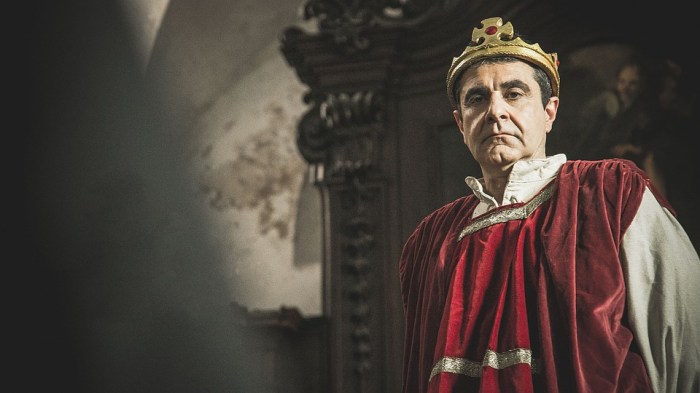Dill quotes in to kill a mockingbird – Commencing with Dill Harris’s memorable quotes in Harper Lee’s classic novel “To Kill a Mockingbird,” this analysis delves into the profound impact of this enigmatic character on the story’s themes, characters, and overall significance.
Through his unique perspective as an outsider, Dill’s imaginative musings ignite the story’s events and challenge the established social norms of Maycomb, Alabama.
Dill Harris Characterization

Dill Harris, a central character in Harper Lee’s “To Kill a Mockingbird,” stands out as a unique and influential figure. His outsider perspective and vivid imagination shape the narrative, contributing to the novel’s exploration of childhood, innocence, and the complexities of human nature.
Dill’s Outsider Perspective
As a summer visitor from Meridian, Mississippi, Dill brings a fresh and unbiased perspective to Maycomb, Alabama. His outsider status allows him to observe the town’s social dynamics with a critical eye, noticing both the warmth and the prejudices that define its community.
Dill’s outsider perspective is evident in his interactions with Jem and Scout Finch. He challenges their assumptions about Maycomb, questioning the town’s treatment of Boo Radley and its racial divide. Dill’s outsider status allows him to see the world in a different light, fostering a sense of wonder and curiosity that enriches the story.
Dill’s Imagination
Dill’s vivid imagination is a driving force in the novel. He transforms ordinary events into fantastical adventures, creating a world of make-believe that captivates Jem and Scout.
Dill’s imagination is particularly evident in his creation of Boo Radley. He sees Boo not as the feared recluse but as a mysterious and intriguing figure. Dill’s imagination fuels the children’s curiosity about Boo, leading them to explore his house and ultimately to form an unlikely friendship.
Dill’s Role as a Catalyst for Change
Through his outsider perspective and vivid imagination, Dill acts as a catalyst for change in Maycomb. He challenges the town’s preconceived notions, encourages Jem and Scout to think critically, and ultimately helps them to understand the complexities of the world around them.
Dill’s role as a catalyst for change is evident in his influence on Jem and Scout. He helps them to see the world from different perspectives, to question authority, and to stand up for what is right. Dill’s presence in Maycomb sparks a transformation in the children, preparing them to face the challenges of adolescence and adulthood.
Dill’s Relationship with Scout and Jem
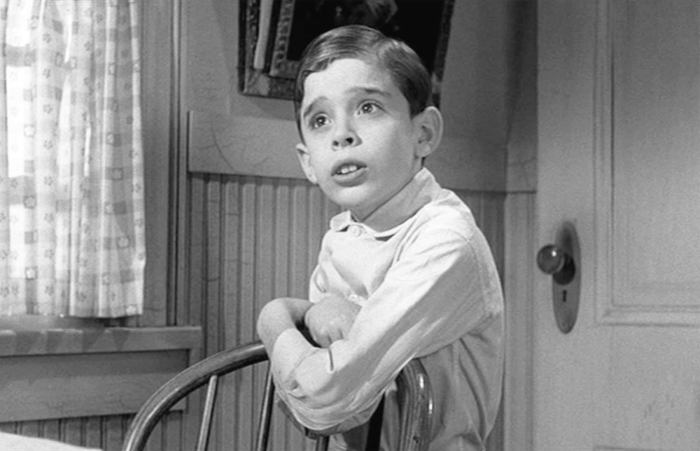
Dill Harris’s friendship with Scout and Jem Finch is pivotal to the novel To Kill a Mockingbird. As a young boy from Meridian, Mississippi, Dill brings a unique perspective and challenges the siblings’ worldviews, complementing their personalities and leaving a lasting impact on their lives.
Significance of Dill’s Friendship
- Provides an outsider’s perspective on Maycomb, challenging the Finch children’s assumptions about their community.
- Introduces Scout and Jem to the concept of childhood innocence and imagination, fostering their creativity and sense of wonder.
- Offers emotional support and companionship, especially during challenging times such as the trial of Tom Robinson.
Dill’s Influence on Scout and Jem
Dill’s influence on Scout and Jem is multifaceted. He:
- Challenges Scout’s tomboyish behavior:Dill admires Scout’s strength and independence but also encourages her to embrace her femininity.
- Inspires Jem’s sense of adventure:Dill’s imagination and willingness to take risks encourage Jem to step outside his comfort zone and explore the world.
- Teaches Scout and Jem the importance of empathy:Through his experiences with prejudice and discrimination, Dill helps the siblings understand the struggles faced by others.
Impact of Dill’s Departure
Dill’s departure at the end of the summer marks a significant turning point in Scout and Jem’s lives. His absence:
- Forces them to confront the reality of growing up and the loss of childhood innocence.
- Leads to a deeper understanding of their own strengths and weaknesses.
- Inspires them to carry on Dill’s legacy of compassion and empathy in the face of adversity.
Dill’s Quotes and Their Impact
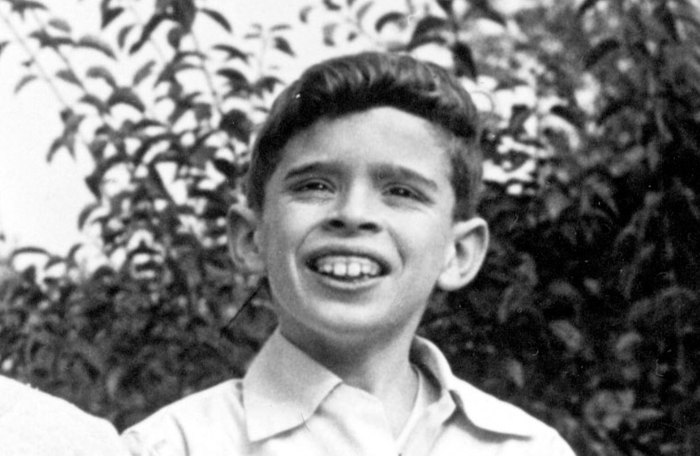
Dill Harris, the imaginative and adventurous young boy who spends his summers in Maycomb, contributes significantly to the novel through his unique perspective and memorable quotes. His words often provide insight into the themes of childhood innocence, the loss of innocence, and the complexities of human nature.
Key Quotes Spoken by Dill
- “I reckon if I was a colored man, I’d have something to say about it.” – Dill’s empathy towards the plight of Tom Robinson highlights his understanding of the racial injustices prevalent in Maycomb.
- “I don’t like him one bit. He’s mean and nasty.” – Dill’s dislike for Bob Ewell foreshadows Ewell’s true nature and the danger he poses to the children.
- “We’ll put a blanket down and take turns sleeping on it.” – Dill’s suggestion to create a “secret” sleeping arrangement symbolizes the children’s desire for adventure and escapism.
- “I think I’ll be a clown when I get grown.” – Dill’s dream of becoming a clown reflects his playful and imaginative nature, as well as his longing for a life beyond the confines of Maycomb.
- “Maybe we could get Scout to go with us.” – Dill’s inclusion of Scout in their adventures demonstrates his recognition of her strength and independence.
Dill’s Role in the Tom Robinson Trial
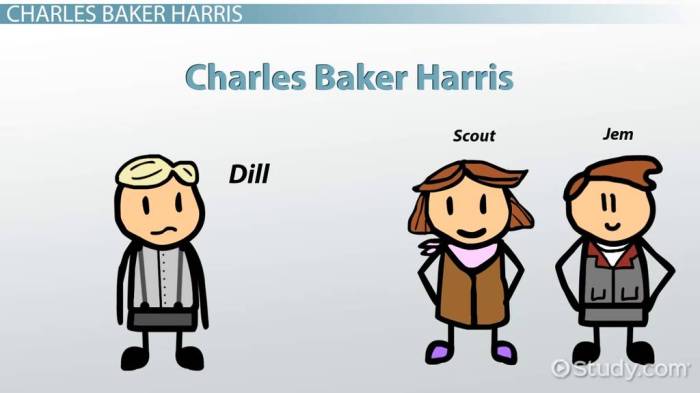
Dill Harris’s presence during the Tom Robinson trial serves as a crucial lens through which the reader witnesses the complexities of the legal proceedings and the racial tensions that engulf Maycomb. As an outsider to the community, Dill brings a fresh perspective that highlights the absurdity and injustice prevalent in the trial.
Dill’s Observations and Perspective
Throughout the trial, Dill’s keen observations provide insights into the characters’ motivations and the underlying dynamics of the courtroom. His innocence and lack of prejudice allow him to see the hypocrisy and bias that permeate the proceedings. Dill’s perspective humanizes the trial, making it relatable to readers and exposing the stark contrast between the legal process and the moral truths at stake.
Dill’s Testimony and Its Impact
Dill’s testimony plays a pivotal role in shaping the outcome of the trial. His account of Bob Ewell’s abusive behavior towards his daughter, Mayella, casts doubt on the prosecution’s case. Dill’s unwavering belief in Tom Robinson’s innocence, despite the overwhelming evidence against him, demonstrates the power of truth and the importance of standing up for what is right.
Although Tom Robinson is ultimately found guilty, Dill’s testimony serves as a catalyst for change within the community. His presence at the trial forces the townspeople to confront the harsh realities of racism and prejudice, and it plants seeds of doubt that will eventually lead to a more just and equitable society.
Dill’s Representation of Innocence and Loss
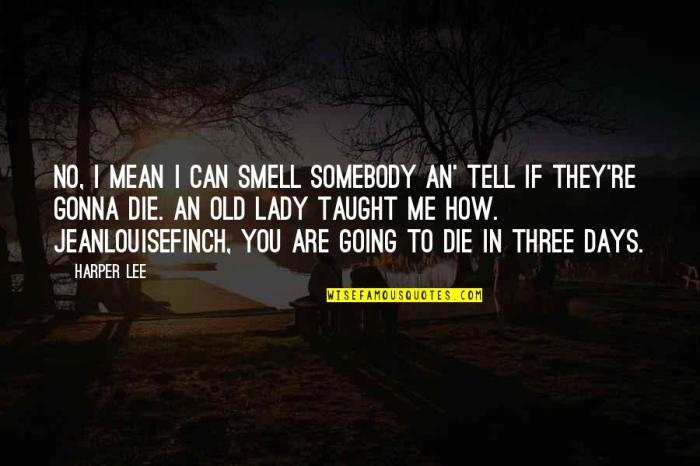
In Harper Lee’s “To Kill a Mockingbird,” Dill Harris serves as a poignant symbol of the loss of innocence and the complexities of childhood. Through his character arc, Dill represents the transition from a carefree and imaginative child to a more mature and aware individual, mirroring the broader changes that occur within the novel’s setting.
Dill as a Symbol of Innocence
Initially, Dill embodies the carefree and imaginative spirit of childhood. He brings a sense of adventure and wonder to the lives of Scout and Jem, engaging in imaginative games and escapades. His vivid imagination and willingness to believe in the fantastical represent the boundless possibilities and innocence of childhood.
Dill’s Changing Nature, Dill quotes in to kill a mockingbird
As the novel progresses, Dill’s character undergoes a transformation. He becomes increasingly aware of the harsh realities of the adult world, particularly the prejudice and injustice prevalent in Maycomb. The trial of Tom Robinson serves as a catalyst for this change, forcing Dill to confront the complexities of human nature and the fragility of innocence.
Dill’s Departure
Dill’s departure at the end of the novel symbolizes the end of childhood and the transition into adulthood. His absence represents the loss of innocence and the realization that the world is not always a safe and just place. It serves as a reminder that the journey of growing up involves both the joys of discovery and the pains of loss.
Essential Questionnaire: Dill Quotes In To Kill A Mockingbird
What is the significance of Dill’s departure from Maycomb?
Dill’s departure symbolizes the end of childhood innocence and the transition into adulthood, as well as the loss of a cherished friendship for Scout and Jem.
How does Dill’s perspective challenge the societal norms of Maycomb?
As an outsider, Dill’s unbiased observations and imaginative nature allow him to question the town’s prejudices and injustices, particularly regarding race and social class.
